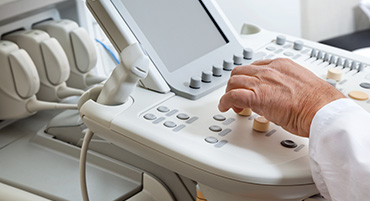Adults
Community Mental Health Centers Emergency Settings / Emergency Departments / Crisis Stabilization Centers
ATP psychiatrists specialize in providing psychiatric evaluations with appropriate disposition recommendations to emergency departments, psychiatric crisis stabilization centers, and other medical settings. Within 30 minutes of receiving a request for services, ATP connects its partners via a HIPAA compliant video connection to a psychiatric provider who has special expertise and experience working in these settings. ATP’s focus is on providing efficient, cost effective, and best practice psychiatric recommendations so that an appropriate disposition can be made quickly, and patients can benefit from swift psychiatric care.
Benefits:
- Prevents unnecessary hospitalizations
- Prevents delays in psychiatric treatment
- Decreases the amount of disruption to the emergency department/crisis center
- Positively impacts staff morale
- Enhances patient and staff safety
Correctional Facilities
ATP psychiatrists have experience and training to understand the unique factors affecting the delivery of psychiatric care in prison and jail systems. ATP is available 24 hours a day to work with our correctional partners. 50% of the jail/prison population has a diagnosable mental illness and of those, 70% have a co-occurring substance use disorder. Correctional facilities often find it difficult to attract psychiatrists to work with this population due to geographic and other barriers. ATP Telepsychiatry solves this issue by providing outstanding psychiatrists and psychiatric nurse practitioners to work with your inmates and staff to provide the best treatment outcome.
Benefits:
- Helps meet federal and state mandates for behavioral healthcare
- Eliminates administrative staff costs to recruit and retain psychiatrists
- Allows for rapid, efficient psychiatric evaluations and medication management
- Allows quick access in emergency situations
- Decreases the correctional facilities’ liability and risk of lawsuits
- Improves staff morale and safety
- Allows for the provision of medication-assisted treatment of inmates with substance use disorders
Substance Abuse Programs
According to recent studies, three out of ten Americans suffer some from of alcohol abuse or alcohol addiction during their lives. ATP psychiatrists are familiar with a variety of medicines used to treat alcohol addiction in patients with substance use disorders or in co-occurring disorders. Up to 50 percent of patients with mental illness also suffer from a substance use disorder. ATP psychiatrists use a number of different medications to help patients abstain from alcohol. ATP psychiatrists are also trained in medication-assisted treatment of patients with opioid addiction.
Benefits:
- Treatment of co-occurring disorders helps stabilize psychiatric patients so their primary mental illness is improved
- Treatment decreases the amount of visits substance abuse patients make to hospital emergency departments
- Treatment decreases crime and decreases the prison population
General Medical / Surgical Hospitals
ATP would like to partner with med/surge hospitals to assist in their patient screening effort. This screening will ensure the hospital and the patient have quick access to a psychiatrist. This access will ensure that the hospital has an accurate disposition. This will ensure the proper clinical outcome for the patient.
Benefits:
- Optimizes patient outcomes
- Decreases disruption for the hospital staff
- Allows hospital physicians to focus on medical patient care while allowing the psychiatrist to have the responsibility and liability of proper patient outcomes with psychiatric patients
- Hospital has return on investment through the proper bed utilization and payer mix through decreasing bad debt on uninsured patients that may test their system.
Emergency Settings
ATP psychiatrists specialize in providing psychiatric evaluations with appropriate disposition recommendations to emergency departments, psychiatric crisis stabilization centers, and other medical settings. Within 30 minutes of receiving a request for services, ATP connects its partners via a HIPAA compliant video connection to a psychiatric provider who has special expertise and experience working in these settings. ATP’s focus is on providing efficient, cost effective, and best practice psychiatric recommendations so that an appropriate disposition can be made quickly, and patients can benefit from swift psychiatric care.
Benefits:
- Prevents unnecessary hospitalizations
- Prevents delays in psychiatric treatment
- Decreases the amount of disruption to the emergency department/crisis center
- Positively impacts staff morale
- Enhances patient and staff safety
- Allows hospital physicians to focus on medical patient care while allowing the psychiatrist to have the responsibility and liability of proper patient outcomes with psychiatric patients
- Hospital has return on investment through the proper bed utilization and payer mix through decreasing bad debt on uninsured patients that may test their system
Psychiatric Hospitals
For a variety of reasons, psychiatric hospitals have trouble recruiting psychiatrists to work in their facility. Most psychiatrists work in large metropolitan areas. Telepsychiatry makes it easy for a psychiatrist to work in any area of the country without having to relocate. Hospitals have easy access to a top quality psychiatrist.
Benefits:
- No recruiting expenses or stress trying to hire a well-trained professional who is a team player and well-liked by patients and staff
- Immediate access to Board Certified ATP psychiatrists
- Ensure hospital remains financially viable through increased admissions 7 days per week
- ATP psychiatrists are well versed in understanding key metrics such as LOS, ADC, and proper payer alignment
Forensic Hospitals
Our psychiatrists have a special interest in working with patients admitted to Forensic Psychiatric Settings. They are trained to evaluate and treat these patients and are trained to complete competency evaluations and to make sentencing recommendations.
Benefits:
- No recruiting expenses or stress trying to hire a well-trained professional who is a team player and well-liked by patients and staff
- Immediate access to Board Certified ATP psychiatrists
Community Mental Health Centers
CMHC’s often find they have high turnover in psychiatrists. Partnering with ATP allows you to focus on provision of services to patients rather than spending staff time, energy and money on recruiting and retaining psychiatrists. Our psychiatrists are passionate about treating the seriously mentally ill and underserved populations.
Benefits:
- No loss of revenue or inability to provide patient care due to lack of psychiatric coverage
- Access to psychiatrists who work comfortably within the treatment team to provide evidence-based treatment in support of patient-centered recovery
Psychologists’ Offices
Many psychiatric disorders respond best to a combination of therapy and medication management. ATP can provide you and your patients easy access to psychiatric care.
Benefits:
- Gives your patients access to a psychiatrist within your own office without having to recruit and retain one or having to refer the patient to someone outside of your office
- It allows you to provide evidence based treatment for conditions in which psychotherapy and medication management are both recommended
Child & Adolescent
The shortage of child and adolescent psychiatrists in the U.S. has reached a crisis level. With only approximately 7,400 practicing child psychiatrists and over 73 million U.S. children, the physician to patient ratio is extraordinarily small. According to the U.S. Surgeon General, about 20 percent of U.S. children and adolescents have a mental disorder with at least a mild functional impairment. Children and their parents often have to drive long distances to receive child psychiatric care. ATP child and adolescent psychiatrists are available to work in a variety of clinical and educational environments.
School Settings:
Children/adolescents with mental health disorders are more likely to receive and follow through with treatment if it can be obtained in the convenience of the school setting. Students and their parents are comfortable in schools and therefore more likely to receive care in a school setting. According to the CDC, mental illness is increasing in children younger than 18. For this reason, treating children in the school setting will positively impact student learning, improve overall school functioning.
Benefits:
- Improves student and parent compliance with evaluation.
- Improves student and teacher satisfaction and safety.
- Decreases the number of days students are out of school.
Juvenile Justice Facilities
Research has shown a surprisingly high population rate of mental disorders in youth in juvenile facilities. Juvenile facilities operate on the foundation of rehabilitating the youth, so incarcerated youth require careful and structured psychiatric intervention by a child psychiatrist. Due to the dearth of child psychiatrists it is often difficult to secure the services of one to see this population.
Benefits:
- Easy access to a child psychiatrist that understands the needs of this special population.
- Allows your company to meet state and federal guidelines regarding juveniles in mandated care.
Substance Abuse Settings
Last year, over 6 million youths between the ages of 12 and 17 needed treatment for an illicit drug abuse problem. Substance abuse programs rely on comprehensive approach to address these problems yet often cannot find a child psychiatrist to be a part of the treatment team. Partnering with ATP Telepsychiatry offers your patients and staff access to a qualified psychiatrist.
Benefits:
- Allows comprehensive care of youth with substance abuse issues.
Geriatrics
Nursing Homes
Nursing homes are under increasing federal and state regulations to decrease the use of antipsychotic medication in nursing home patients. At the same time, the proportion of nursing home residents with mental disorders is increasing. ATP employs psychiatric experts in the field of geriatric psychiatry who are compassionate in their care of elderly patients and their families.
Benefits:
- Helps you regularly meet requirements regarding antipsychotic use in nursing home patients.
- Ensures that your medical directors and staff are confident that the appropriate professional monitors all psychiatric issues.
- Ensure each facility receives the return on investment through the process of treating the patient at the facility without loss of census.
Collaborative Care
Collaborative care is a healthcare philosophy that has many models and definitions. However, the key features of this model are:
1) Integration of mental health professionals in primary care medical settings
2) Close collaboration between mental health and medical providers
3) Focus on treating the whole person and whole family.
Federally Qualified Health Clinics
These include, for example, community mental health centers and community health clinics. They are community-based organizations that provide comprehensive primary care and preventive care.
Benefits:
- State and federal guidelines are urging the integration of mental health into primary care in order to decrease health costs and improve patient outcomes. In many cases, continued funding may require this integration. ATP Telepsychiatry provides an instant ability to form such partnerships./li>
Primary Care Physician Offices
Primary care is now the sole form of healthcare used by over one-third of patients with a mental disorder accessing the health care system. Most antidepressants are written by primary care physicians. Forty-five percent of patients who die by suicide have seen their primary care physician the month before their death whereas 20 percent saw a mental health professional. For these reasons and many others, integrating a psychiatrist into your primary care office will improve your ability to improve patient care.
Benefits:
- ATP telepsychiatrists and nurse practitioners can fit easily into your office care model and allow your patients to receive the best holistic care available./li>
Best Practices Medical Teams
Comprehensive cancer, cardiac and other specialty care recommends a treatment team approach to the care of patients with serious specialty medical and surgical medications.
Benefits:
- Your team can be on the cutting edge of providing comprehensive evidence-based care by including a psychiatrist as part of the treatment team.
Professional Services
ATP Telepsychiatry also provides a number of other unique psychiatric services.
Employers
Our psychiatrists are experienced at performing Return-to-Work Evaluations as well as other services for your employees. Our goal is to help you have happy, healthy employees who do not miss work due to mental health issues. Employers won’t have to pay for travel expenses for doctor or for patient.
Insurance Companies
Our psychiatrists are ready to service your covered lives.
Forensic Psychiatric Services
We have psychiatrists trained to work with courts to evaluate a person’s competency to stand trial as well as make a determination regarding other legal psychiatric questions. Additionally, we work with lawyers on a variety of issues including providing expert witness testimony.
TECHNICAL SERVICES
Telemedicine program needs assessment, Technology planning, assessment & Strategy, training and follow-up.




